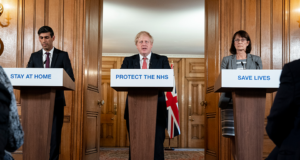21 February, 2023
Nawal Abdisamad, Research Assistant
As with many other British institutions, allegations of racial discrimination have been repeatedly made against the National Health Service (NHS). Evidence tends to support this assertion. Research shows that almost two-thirds of black patients have experienced discrimination – rising to three-quarters amongst black 18–35-year-olds. This is extremely damaging on multiple levels. Fair, equal and civilised treatment is an absolute minimal expectation from a public service upon which most of the UK population funds and depends. Discrimination against patients can impact on short-term health outcomes by resulting in inadequate immediate treatment, and cause longer-term public health challenges by deterring minorities from accessing preventative provision such as screening programmes that can pre-empt the need for gruelling and expensive treatment later on. Against staff, it can result in personal distress and physical harm, impede work efficiency and deter recruitment. Where racism is present in critical public services, everyone loses, and a major barrier to human security is created.
It is unfortunate that the most negative view of the health service is held by ethnic minorities that have been mistreated and ignored, resulting in them often being misdiagnosed or having to exaggerate their symptoms. This is because they feel discriminated against due to the colour of their skin. They have felt prejudice from doctors and other staff in healthcare settings, leading to them not building that rapport with them and feeling like they are not being taken care of properly. Just one example of a plethora of case studies is the and developed sepsis – a life-threatening blood infection – just after giving birth and required urgent assistance. However, she was instead told to go home despite being in immense pain and crying in fear. Once a senior midwife heard of this, she knew the patient would be black because she had seen this exact kind of treatment towards black women many times before. Wider research backs up the example, with black women four times more likely to die during pregnancy or childbirth than white women, and Asian women twice as likely to die. Ethnic inequalities in both neonatal and maternal health are a vital issue, so it is disappointing to know that in over 40 years of published factual evidence only 19 interventions were found that aimed at broadly tackling those ethnic inequalities. This further demonstrates the lack of care and normalisation of racial bias, as is so ingrained and deeply rooted in the system and institution.
A critical issue behind poor treatment of black patients has frequently been found to be ingrained racial bias – most notably often regarding pain tolerance. This issue goes back to slavery, when the physicians would assume that the black slaves could endure and tolerate more pain than their white counterparts. In the US, such beliefs also justified the use of black people for medical research purposes, including operations without anaesthetic and the testing of chemical weapons. One survey showed that half of white medical students and residents still hold this belief, and those who rated black pain levels as lower than those of white patients made inappropriate treatment recommendations. This is perhaps unsurprising given that until the 1970s, medical textbooks professed similar views on black people having high pain thresholds. While such in-depth research on the attitudes of NHS staff is lacking, statistics show that black patients are half as likely to be prescribed pain medication in a US emergency department as white patients, which may indicate a similar phenomenon in the UK.
Cancer is another major issue. Again, pain medication proscription is a factor. But even more disturbing is that of late diagnoses: recent data shows that black women are significantly more likely to receive a later diagnoses of cancer than white women. There are a multitude of reasons for this, ranging from a failure to recognise the signs of cancer to embarrassment and lack of confidence in engaging with healthcare practitioners. But the fact that the healthcare system is systematically failing to empower all racial groups is a clear sign that it is not living up to its duty to ensure everyone receives equal care.
Other issues with the medical treatment of black and other ethnic minority individuals are more subtle, but also potentially damaging. Notably, anatomy textbooks typically focus on white patients. This means that doctors are ill-equipped to treat black and ethnic minorities in certain situations. For example, rashes are well known to be presented differently on different types of skin colours. Only learning how rashes present themselves on one specific skin type can leave doctors struggling to diagnose illnesses such as meningitis and measles on other skin types. Kawasaki’s disease – although rare overall – is the most common form of heart disease in children. Yet the skin peeling which signifies it presents differently on non-white skin types, leaving the path open to misdiagnosis by someone with incorrect training.
While we may feel that technology provides a route around racial bias, the unfortunate truth is that many medical devices have such bias unintentionally built into them. One example is the devices that measure oxygen and infrared scanners, which may not always perform well or effectively on those people who have darker skin pigmentation. There are also fears that the increasing use of AI in diagnoses could increase bias due to white patients dominating the data used to train the algorithms, meaning that the data fails to represent ethnic minority groups and instead focuses on white counterparts which inevitably excludes a whole set of communities and leaves them underserved by AI.
There is also the issue of the experiences of NHS staff. It is perhaps no surprise that the NHS is ‘riddled with racism’ – not just towards the patients but also towards staff members. Ethnic minority staff have reported being belittled, abused and having their careers harmed by white staff members. While the NHS professes to have a “zero tolerance” approach to racism, many individuals are afraid to complain. More than three quarters of ethnic minority doctors recently surveyed said that they had experienced racism in the last year. Just as racism affects the patients mentally and physically, it also affects the mental well-being of ethnic minority doctors, nurses and support staff. COVID-19 has recently demonstrated that this pattern continues when staff become patients: If in the first month of the Covid Pandemic, data shows that black, Asian and other minorities accounted for 72% of NHS staff deaths from COVID, but only made up 44% of staff.
It is about time something is done to tackle this prejudice and start to act on these statistics of deaths and errors. It is time for a proper change in these healthcare services – and not just the one-off unconscious bias training that does not tackle the deep-rooted injustice and prejudice. It is time to tackle it head and one way to deal with it is by acknowledging that the very nature of institutional and structural racism means that issues concerning race and equality need to be “embedded from throughout the design and implementation of any effort or meaningful intervention”. It is the responsibility of the health providers to create and make systemic change across the board whether that be in funding research or designing to make sure that intervention efforts are suitable for the task at hand, and that they are developed using input from the communities they will effect.
Image: Queen Elizabeth Hospital Birmingham (Source: Tony Hisgett/ CC BY-SA-2.0)
 Human Security Centre Human Rights and International Security Research
Human Security Centre Human Rights and International Security Research




